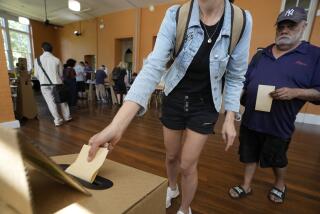U.S. Shocked by Loss of Seat on U.N. Rights Panel but Vows to Stay Active
- Share via
WASHINGTON — The Bush administration admitted Friday that the United States had lost its seat on the U.N. Human Rights Commission this week after receiving “solid, written assurances” of support from 43 countries in advance--only to get just 29 votes during the secret ballot.
Secretary of State Colin L. Powell said he was astonished and disappointed at the outcome, ending more than half a century in which the United States was the moral anchor of a group co-founded by former U.N. delegate and First Lady Eleanor Roosevelt.
American diplomats had campaigned hard in New York, Geneva, Washington and several foreign capitals, the State Department said Friday. Powell blamed the vote in part on unease about some U.S. policies on human rights and other initiatives. He also said some countries were “ganging up” on the United States to “thwart our efforts.”
Cuba, a member of the commission, crowed Friday that American arrogance and coercion used to achieve its agenda in international bodies cost the United States a seat it had held since 1947. China charged that Washington has used human rights as a political weapon. China and Cuba had been targets of U.S.-backed resolutions criticizing their human rights practices during the 53-member commission’s annual meeting in Geneva this year.
The administration tried to downplay the damage. White House spokesman Ari Fleischer said the loss would not stop President Bush from speaking out about the importance of human rights around the world, as he did Thursday in a speech about religious persecution, particularly in Sudan.
Sudan was one of the countries elected to the commission Thursday. Also on the committee are serious human rights violators such as Algeria, China, Libya, Saudi Arabia, Sierra Leone, Syria, Togo, Uganda and Vietnam. Democracies are now a distinct minority on the commission.
“This is a rogues’ gallery of human rights abusers,” said Joanna Weschler, U.N. representative of Human Rights Watch, a New York-based monitoring group.
At the same time, she said Washington had recently been “on the wrong side” of human rights issues, opposing a land mine ban, an international criminal court and universal access to AIDS medications, which had cost votes from friends.
Powell warned that the U.S. defeat and the membership of countries such as Cuba and Sudan send a “shocking message.” Although it has lost the right to vote and introduce resolutions, Washington will continue to work with the commission by lobbying as an observer, he said.
Other U.S. officials conceded in private that they were stunned by the diplomatic disaster and the failure of Washington to win votes even from allies. “This is a very negative and worrisome signal, not just because we lost the seat,” said a U.S. official involved in human rights who asked to remain anonymous because of the sensitivity of the topic.
“It’s one way to express dissatisfaction with the U.S. without breaking relations. And it’s a secret vote, so it’s an opportunity for countries to get back at us or diminish our influence. The biggest danger is that it sets a dangerous precedent,” the official said.
He said there was a “league of nondemocratic states” determined to silence the U.S. voice.
The vote has endangered more than $600 million in back payments due the United Nations and approved by the House International Relations Committee just a day before the election. House members from both parties have indicated that they will contest the funding when it goes to the full House next week.
In other foreign policy developments, Powell predicted in a wide-ranging interview with diplomatic reporters Friday that tensions with China, stoked by the April 1 collision between a U.S. surveillance plane and a Chinese fighter jet, would soon end.
Beijing is cooperating on the issue of the damaged plane still stranded on Hainan island, although the process has been hampered by some “irritants and hiccups,” he said. At the same time, however, he said the United States is engaged in reviewing all future contacts and exchanges with China.
On North Korea, Powell said he welcomed Pyongyang’s pledge--made during a visit this week by European Union envoys--to extend a moratorium on the sale of ballistic missiles. He said the Bush administration has continued low-level contacts started during the previous administration through North Korea’s U.N. mission.
As for Iraq, Powell said the State Department was quietly working to build Security Council support for a streamlined sanctions policy on Baghdad.
More to Read
Sign up for Essential California
The most important California stories and recommendations in your inbox every morning.
You may occasionally receive promotional content from the Los Angeles Times.










